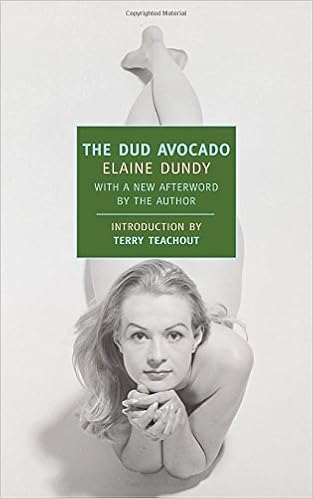"Stefan, please..."
"No, it's true. And I will tell you something really extraordinary, mes enfants. Do you know that you can just take the stones of these luscious fruits, put them in water--just plain water, mind you--anywhere, any place in the world, and in three months up comes a sturdy little plant full of green leaves? That is their sturdy little souls bursting into bloom," he finished off, well satisfied with his analogy."
"Well, this one isn't going to burst into bloom," I said morosely, putting my nose in my drink. "What you've got here is a dead one."
"A what? A dud one?"
I took my face out of the glass. "No, dead. Dead. Oh, forget it."
Max raised his glass and smiled at me. "The dud avocado," he said, proposing the toast.
Sally Jay Gorce walks down the Boulevard St. Michel in the morning in an evening dress--it's laundry day--on the way to meet her Italian lover. Instead, she's waylaid by an old American friend, Larry, with whom she has a drink, and falls instantly in love. This sets off a variation on the old innocents abroad story, in which Gorce is introduced to a bunch of bohemian types, drinks and sleeps around a lot, spends a disastrous month at a cottage in the French Riviera, and becomes, eventually, inevitably, disillusioned of her initial wonder:
And then one day, one memorable day in the early evening, I stumbled across the Champs Elysees. I know it seems crazy to say, but before I actually stepped onto it (at what turned out to be the Etoile) I had not even been aware of its existence. No, I swear it. I'd heard the words "Champs Elysees," of course, but I thought it was a park or something. I mean that's what it sounds like, doesn't it? All at once I found myself standing there gazing down that enchanted boulevard in the blue, blue evening. Everything seemed to fall into place. Here was all the gaiety and glory and sparkle I knew was going to be life if I could just grasp it.
It's kind of familiar story that has an expected resolution: Gorce has to find out that she doesn't need to travel to experience life. To emphasize this point, her Uncle Roger--who's footing the bill for this two-year jaunt in Paris--writes her that he's given up the study of astronomy and started studying microscopic animals. The big for the small--the sky for the earth.
It's a kind of familiar story, but Gorce is such a strong presence, and Dundy has such a confident way with the voice of a young, clever woman who is quickly growing up, that that doesn't matter. ("[A]ll the impulsive, outrageous things my heroine did, I did," Dundy writes in the post-script. "All the sensible things she did, I made up.") And the book is peopled with vivid, specific comic characters: the snobbish Italian Contessa; the Ancient, a kind of Hemingway figure that the bohemian sat gather around like royalty; the sickly friend Judy who lives vicariously through Gorce's exploits; a man named Hugo who hangs around great authors offering his services as a model for characters; and various blue-bloods, rakes, and buffoons. And there's Larry, who's Bohemian charisma turns out to mask something much more sinister:
The mat of auburn hair curling to his skull, the gray-green eyes now so blank and far away, the delicate scar running down the pale skin of his forehead, the well-shaped nose covered with a faint spray of freckles, with his large mouth, gently curved, all contributed to give his face, especially in repose, a look of sappy sweetness that was sharply at odds with--and yet at the same time enhanced--his tough, wise-guy manner. Maybe because I had been out very late the night before and was not able to put up my usual resistance, but it seemed to me, sitting there with the sound of his voice dying in my ears, that I could fall in love with him.
And then, as unexpected as a hidden step, I felt myself actually stumble and fall. And there it was, I was in love with him! As simple as that.
I want to quote pages and pages of this book because of the wonderfulness of the voice. It reminds me--and I hate myself for saying this--of a female Holden Caulfield. Gorce is not bitter, but rather a little naive, but the breezy casualness that belies a profound thoughtfulness is straight out of the Salinger playbook. I fear that it might sound a little Bridget Jones from these excerpts--Terry Southern makes that comparison in the introduction--but there's too much real humor and too much real tragedy in The Dud Avocado. I'll just quote the end; I won't ruin it by telling you what she's talking about but it's too perfect not to quote:
It's so chic. It's so suave and so sleek and exotic. It's the end, it's the end... It's the last word.
It's zymotic.


1 comment:
YES SHE IS 100% FEMALE HOLDEN!!!
Post a Comment